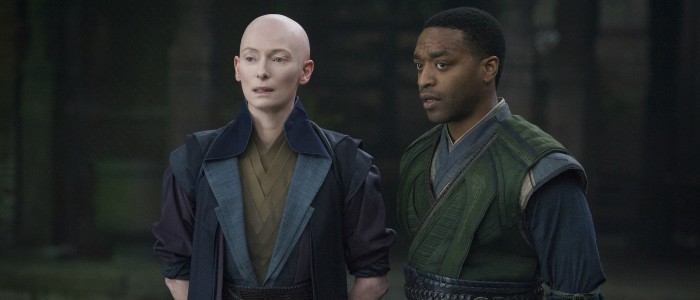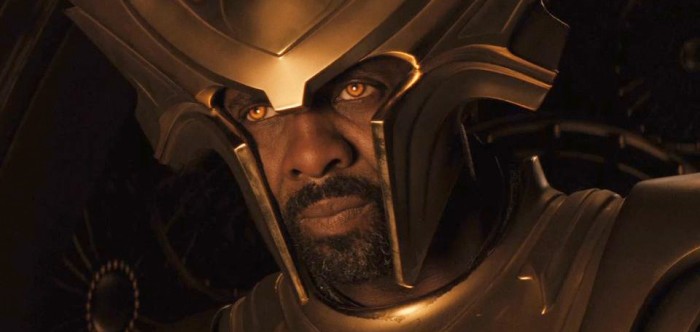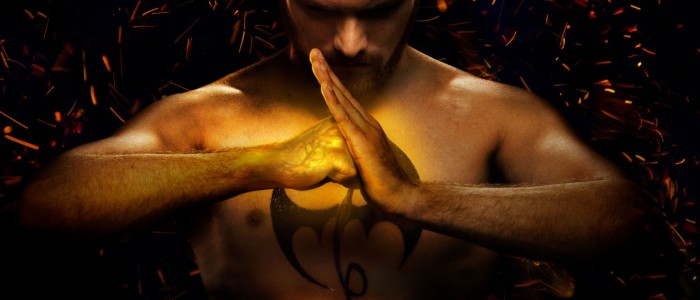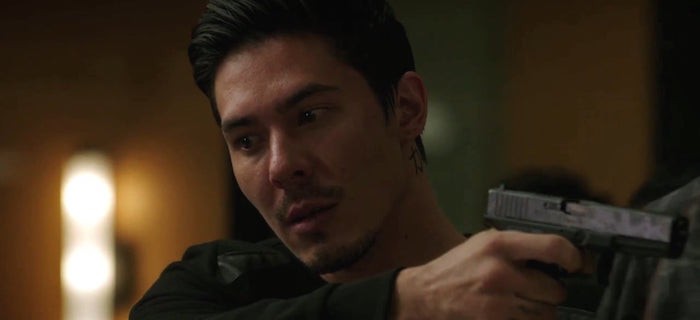Marvel Almost Had An Asian-American 'Iron Fist,' But They Blew It
(Welcome to The Soapbox, the space where we get loud, feisty, and opinionated about something that makes us very happy...or fills us with indescribable rage. In this edition: why Marvel's Iron Fist really blew it by not casting Lewis Tan in the lead role.)
Could Iron Fist have been received better if it had cast an Asian-American as Danny Rand?
Until now, that was a pipe dream for many critics of the latest Marvel Netflix show, who lambasted the series for perpetuating the myth of the white savior by choosing to stay loyal to the comic-book depiction of Rand: as a white, blonde outsider who can punch things with his magic fist. But it was recently revealed that half-Chinese actor Lewis Tan, who played one-off villain Zhou Cheng in episode eight of Iron Fist, was on hold for the part until they ultimately cast Game of Thrones alum Finn Jones.
Let me take a deep breath. I have a lot to say about this.
The calls for an Asian-American Iron Fist started long before Jones was cast in the role of the fourth Defender. The argument was that the casting reversal would have turned the dated white savior narrative — in which a Western outsider arrives in an Asian setting and is able to essentially best the natives at a specialty rooted in their own culture — into a story about an Asian-American reclaiming his roots.
It was a long-shot for Marvel, who might have cast supporting characters as different races or gender (Idris Elba as Heimdall in Thor, Carrie-Ann Moss as Jeryn Hogarth in Jessica Jones and Iron Fist, Samuel L. Jackson as Nick Fury), but had yet to do something so bold for a lead role. Though it turns out, they almost did.
Half-Chinese, half-white actor Lewis Tan (who was born in England but raised in California) revealed in an interview with Vulture that he originally read for the part of Danny Rand, and even got to the point where they were talking about his availability and schedule. But when the part went to Jones, Tan got cast as a one-episode villain. As he explains:
"Yeah, I read for Danny originally. I think they were highly considering it at one point in time, but it would have definitely changed the dynamic of the show. It would have been a different show."
Indeed, Jones' casting may have sparked more criticism than the producers and showrunner Scott Buck anticipated, but they looked to redeem Iron Fist when the series dropped on Netflix last week. Needless to say, they did not. But would a person of color in the lead role have actually changed anything?
Iron Fist Offers a Landmine of Problems
The erasure of Asians in Hollywood has been a hot topic as of late, with controversies bubbling up over the casting of Tilda Swinton as the Ancient One in Doctor Strange and Scarlett Johansson as the lead in Ghost in the Shell. But those were different, and less complex examples than the one surrounding Iron Fist. The first two were prime examples of "whitewashing," in which Asian roles are effectively erased and replaced with Western actors. As a minority group that often isn't seen as a minority, this becomes a problem with representation as Asians are pushed even further into the background without any platform to argue against it.
Iron Fist, as a comic book, was dated from the get-go. Inspired by the kung-fu craze of the '70s, Iron Fist essentially reveled in the kung-fu exploitation genre, taking the gimmicky norms of the films and giving them a superhero twist. So this meant that, yes, Danny Rand was the white kid who beat the original practitioners of a mystic martial arts, earning the sacred power of the Iron Fist – because only an outsider can truly understand how to transcend the teachings steeped in centuries of history! That's what the kung fu B-movie genre did — turn orientalism into a stepping stone for a badass superpower.

Why an Asian-American Iron Fist Could Help the Worst-Represented Minority
So it was inherently difficult to adapt this comic book without stepping into those landmines of Asian erasure, white saviors and the exoticisization of Eastern culture. Casting an Asian-American would have remedied that, by virtue of such an actor already being from two different worlds. The outsider narrative? Done – first and second-generation Asian-Americans already wrestle with being loyal to their parents' culture or to the American culture in which they're raised, ultimately being accepted by neither. The white savior narrative? Saved – an Asian-American who has no connections to their parents' or ancestors' homeland going back to Asia is a wonderful metaphor for reclaiming their power.
Tan is aware of the implications had he been cast, telling Vulture that it was "a missed opportunity" for Marvel to help improve the representation of Asians in Hollywood:
"There's no more of an outsider than an Asian-American: We feel like outsiders in Asia and we feel like outsiders at home. That's been really difficult — especially for me... So I understand those frustrations of being an outsider. Like Danny's character."
Being loyal to the comics is admirable, but even more so is leveling the playing field. I saw a great metaphor on Twitter (that great source of all good and evil) about why turning white roles into Asian roles is great for representation. Imagine two bowls of M&Ms (that Iron Fist reference is intentional). One is fuller than the other, but we keep taking more M&M's out of the other bowl and putting it in the full one (Swinton, Johansson, Emma Stone in Aloha). Just one more M&M given from the full bowl to the nearly-empty bowl is a step forward.
Could a Casting Reversal Have Really Helped Iron Fist?
Iron Fist is undeniably the worst-received Marvel Netflix show since Daredevil season 2. Since it arrived on Friday, the show has been criticized for its slow pace, poor character motivations, and — worst of all! — bad fight scenes. At least in that regard, casting Tan may have helped the fight scenes. Tan is a martial arts enthusiast and could have given a boost to the action sequences in the show, something the show is seriously lacking in, despite being centered around a martial artist superhero.
But could have Tan helped the sluggish show take on a new energy and "changed the dynamic" of the show as he hypothesized? Who knows. In the end, it just becomes a question of "What could have been?" as well as "What should have been."



